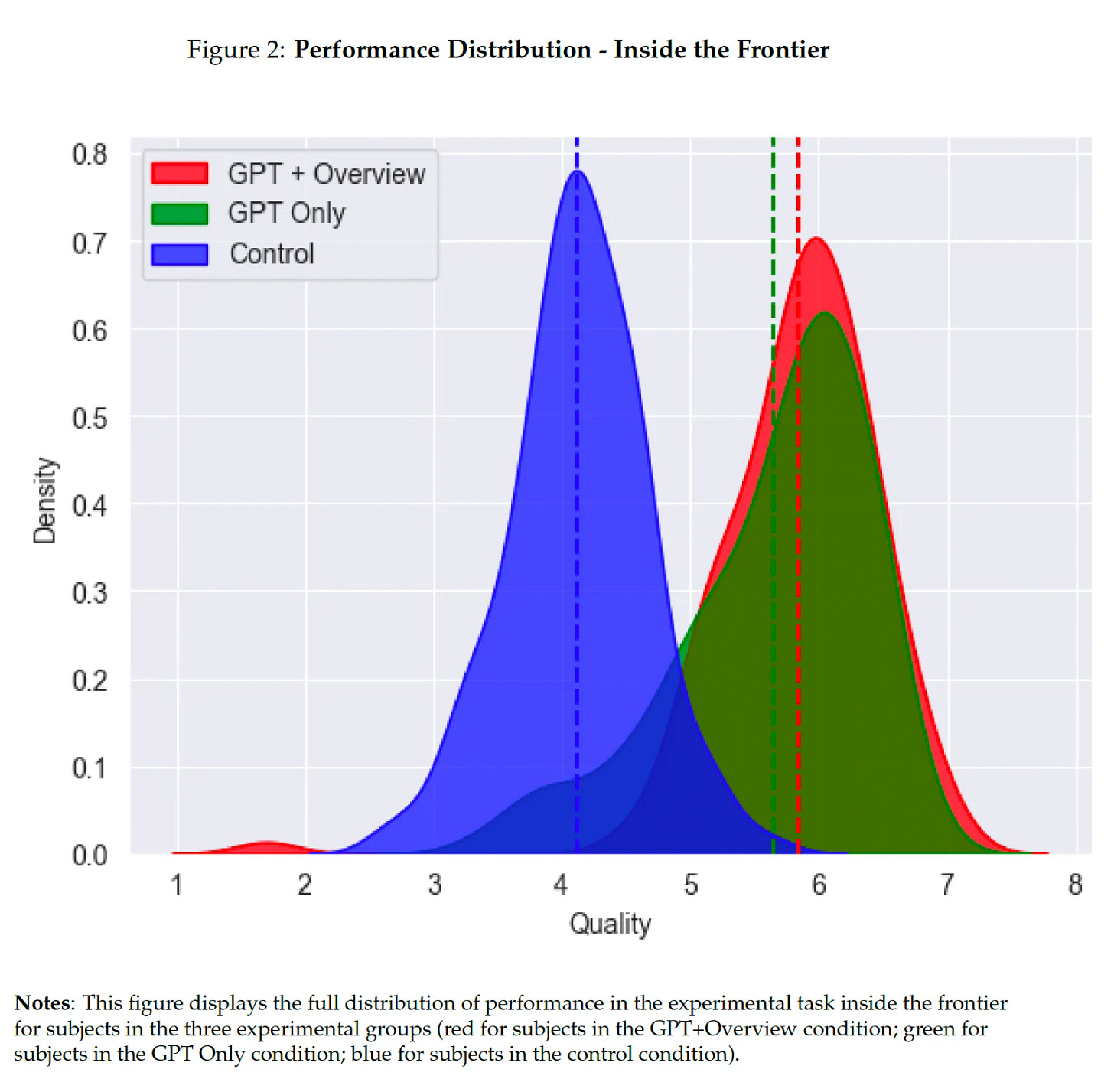Hello,
Sorry for the prolonged wait since my last update. As I mentioned previously, I underwent a major surgery, and my recovery has been slow. But here I am, and I hope we can resume our weekly meetings like before🤓
AI in the Professional Sphere: A Closer Look
It's a new world in the realm of AI, especially with tools like ChatGPT changing the game. We're seeing AI step up in areas where it's traditionally been humans doing the heavy lifting, particularly in jobs that need a lot of brainpower. But it's not all smooth sailing.
While AI can be a big help in some tasks, it can trip us up in others, especially where it's not quite up to speed yet. We are going deeper with how AI is reshaping the work of skilled pros, showing us where it shines and where it still has room to grow. It's a bit of a mixed bag – AI can boost productivity in its comfort zone but might pull you back if used in the wrong context. The key? Knowing when and how to use AI effectively in our day-to-day work.
LLMs in Consultant Settings
A significant study on BCG sheds light on the nuanced effects of LLMs:
Key Findings:
Enhanced Efficiency and Quality:In tasks suited to AI's strengths, AI led to a 12.2% increase in task completion, 25.1% faster execution, and a 40% boost in quality.
The study's Figure 2 highlights the stark performance improvements with AI. Both AI-assisted groups outperformed the control group, with a 42.5% and 38% increase in scores, respectively.
This underscores AI's potential in tasks traditionally reliant on intensive human interaction.
Performance Variability:Below-average consultants saw a 43% performance increase, while above-average consultants experienced a 17% rise.
Quality and AI Text Retention:Figure 8 from the study reveals an intriguing aspect: the quality of recommendations improved with AI assistance, regardless of the correctness of the underlying recommendation.
Higher quality scores correlated with more extensive use of ChatGPT's text, suggesting a complex relationship between AI reliance and output quality.
This illustrates AI's complex influence on professional workflows.
Challenges Identified:
Limitations in Certain Tasks:The study designed a task outside AI's current capabilities, involving a business case with nuanced data analysis. AI struggled in these scenarios, highlighting its limitations in tasks requiring deep insights from disparate data sources.
Reduced Idea Diversity:Despite the improvement in individual idea quality, the collective diversity of ideas saw a 41% decline, raising questions about AI's impact on creative plurality.
Training vs. Access:Interestingly, consultants trained in LLM usage underperformed compared to those with just access to AI, suggesting that training might lead to overdependence on AI solutions.
NK’s take away
So, we've got this study that's pretty much the first of its kind. It's all about how those fancy AI tools, like ChatGPT, are shaking things up in jobs that usually need a lot of brainpower. And let me tell you, it's a bit of a rollercoaster.
First off, the good stuff: When AI gets it right, it really nails it. We're talking about tasks getting done faster, more of them getting finished, and the quality? It's like having a super-smart helper who's great at certain things. This is huge because it shows how AI can be a game-changer in making our work better and faster.
But, here's the twist: AI isn't perfect. When it steps out of its comfort zone, things can get a bit wobbly. The study found that sometimes, when people lean too much on AI for the tricky stuff, it can backfire. They might think they're doing great, but actually, the work isn't as good as it could be. It's like using a calculator for a math test but not really knowing if you're punching in the right numbers.
This whole thing is a big deal because it's showing us the real picture of what AI can and can't do in the fancy jobs.. The trick is knowing when to use it and when to rely on good old human smarts.
So, what's the takeaway?
We're learning to balance AI's strengths with its limitations, and this journey is as exciting as it is complex.
Speaking of journeys, there's been a significant development in the world of AI leadership. Sam Altman, the head of OpenAI, has recently been in the spotlight. Rumors are swirling about his departure from the company.
This shift at the top of OpenAI might raise some eyebrows and questions. What does this mean for the future of AI development? How will this change affect the direction and ethics of AI research? With a change in leadership, we might see new strategies, new focuses, and maybe even new challenges. What do you think regarding these news?
Feel the pulse of the evolving AI landscape? Share your insights in the comments below. Let's build a hub of innovation and vibrant discussion! 💖








